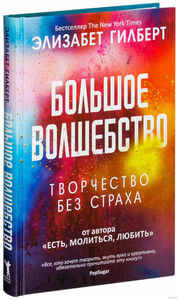You need to sign in or sign up before continuing.
Take a photo of a barcode or cover
Overall, the book jacket description is what was delivered, so be sure to read the jacket to see if this is what you want to read about. The description is clear that this is Gilbert's thoughts on creativity and her desire for people to do a number of things to uncover and nurture their own creativity whether as a full time creative life or as part of daily routines and lives that already exist. This includes things like being curious, letting go of the stereotype of the artist as suffering for their art, being persistent, and so on. It also states that Gilbert will help you uncover your own creativity. If you already know you are creative, have your own "process" or rituals, then this may not be worth the read, especially if you do not like the connection to spiritual that should not come as a surprise in writings by this author. There is much reference to creativity as spiritual.
If you are someone who does not feel creative, has buried creativity while life happened, have fears that stop you, or would like to lead a more creative life, then this book will likely be interesting to you and offer pragmatic ideas and confidence boosters on how to move forward. Gilbert tells some interesting stories to support her ideas and views, some from her own life and people she knows, some from history. I like this approach. Learning something new about famous people in history or in current times, is fascinating.
Some of the positive messages I found in this book:
- There is plenty to go around for everyone, there is room for creativity everywhere
- Be ok with failure or when an idea doesn't work out, learn from it
- Be curious, look for ideas or inspiration everywhere
- Take it easy on yourself and others, be positive
- Discipline is likely needed and some of it is not glamorous
- Create for the sake of creating
- Grab inspiration when it comes and let it go when it is fleeting
- Live out loud
- Be confident
- Be conscious of your creativity so you can see ideas
- The role of ego
- Managing perfectionism
- Taking it too seriously (or not)
Where the book fell short for me was that I felt there was a missed opportunity to tie thoughts, ideas, advice into application in life holistically vs as a specific focus on art as separate from other parts of careers that are not in the arts. This includes examples of people who work in fields that are not considered the arts and still use creativity, curiosity, daily discipline, recognize magic to get things done and improve their daily life. I would have been interested in reading those types of examples. The description of the book stated that the author would help with infusing creativity into our daily lives, but I'm not sure that felt like the objective vs infusing creativity into specific works or projects or types of art as part of your life, but it didn't feel like infusion.
The second place where I felt content was glossed over was the idea of tackling a more creative life later or at an older age. While there was one example (that I remember) in the book, it was just one and I would assume there are other readers out there, like myself, that would have liked more content around "shifting gears" to a more creative life (or returning to one) at a later age and how to do that besides getting over fear, being courageous and so on, when likely by a certain age most have done some of that.
Overall, the writing itself was well done, I expected that from the author. There was great advice from the author about overcoming fear, being courageous, how to balance the needed ego with an ego that goes too far, not being perfect, keeping at it yet knowing when to let an idea go.
Recommend for people who don't consider themselves creative or creative people who let doubts, insecurities, or fear get in the way.
If you are someone who does not feel creative, has buried creativity while life happened, have fears that stop you, or would like to lead a more creative life, then this book will likely be interesting to you and offer pragmatic ideas and confidence boosters on how to move forward. Gilbert tells some interesting stories to support her ideas and views, some from her own life and people she knows, some from history. I like this approach. Learning something new about famous people in history or in current times, is fascinating.
Some of the positive messages I found in this book:
- There is plenty to go around for everyone, there is room for creativity everywhere
- Be ok with failure or when an idea doesn't work out, learn from it
- Be curious, look for ideas or inspiration everywhere
- Take it easy on yourself and others, be positive
- Discipline is likely needed and some of it is not glamorous
- Create for the sake of creating
- Grab inspiration when it comes and let it go when it is fleeting
- Live out loud
- Be confident
- Be conscious of your creativity so you can see ideas
- The role of ego
- Managing perfectionism
- Taking it too seriously (or not)
Where the book fell short for me was that I felt there was a missed opportunity to tie thoughts, ideas, advice into application in life holistically vs as a specific focus on art as separate from other parts of careers that are not in the arts. This includes examples of people who work in fields that are not considered the arts and still use creativity, curiosity, daily discipline, recognize magic to get things done and improve their daily life. I would have been interested in reading those types of examples. The description of the book stated that the author would help with infusing creativity into our daily lives, but I'm not sure that felt like the objective vs infusing creativity into specific works or projects or types of art as part of your life, but it didn't feel like infusion.
The second place where I felt content was glossed over was the idea of tackling a more creative life later or at an older age. While there was one example (that I remember) in the book, it was just one and I would assume there are other readers out there, like myself, that would have liked more content around "shifting gears" to a more creative life (or returning to one) at a later age and how to do that besides getting over fear, being courageous and so on, when likely by a certain age most have done some of that.
Overall, the writing itself was well done, I expected that from the author. There was great advice from the author about overcoming fear, being courageous, how to balance the needed ego with an ego that goes too far, not being perfect, keeping at it yet knowing when to let an idea go.
Recommend for people who don't consider themselves creative or creative people who let doubts, insecurities, or fear get in the way.
Parts of this were really inspiring, being a college student with outside creative writing endeavors that I can’t always devote my time to. A lot of what she said was very relatable and made me feel seen. I listened to the audiobook which is read by Elizabeth Gilbert herself!
2.5 really. I appreciate a couple of the ideas Gilbert was describing, however a lot of the chapters felt like they were boasting of her own self importance. I don't feel like I would ever be able to relate to someone like Gilbert in real life. I would love to be able to take half of her confidence and apply it to my life though. I didn't pick up any new ideas or find any ways to inspire creative living within this book. A lot of this felt like common sense, and a reiteration of other more inspiring authors ideas.
inspiring
lighthearted
relaxing
fast-paced
I’m new to the world of self help books, but I found this to be quite encouraging while also remaining realistic for my tastes. I liked some of the ideas the author proposed, specifically the mindset of having a “partnership” with creativity rather letting ourself be slave or master to it. I think it’s a good book to read when in a funk, which was what I needed.
Quite possibly the only self help book I'll ever be able to finish. I'd even read it again!
challenging
informative
inspiring
reflective
medium-paced
At first, I thought this was a love letter to her writing. In part, I believe that it is, but it is also a call to open creativity and follow one's passion. As someone who often finds myself on a quest for my passion, I appreciated the advice for people like me who have no idea what their passion might be. I have never heard it put so simply and beautifully.
hopeful
reflective
medium-paced
Looks like she really meant it when she said I'm writing this book for myself and not you. It really felt like a bunch of ramblings written after a week of sleepless nights. It did not feel like it was edited at all, I suppose that does align with her thoughts in the book. Honestly each of those chapters could have been condensed to one single message and hence six messages in total which could have been 1 page instead of 300. My only takeaways from this book really are that you should steadily pursue what you like (mostly in the background of other more important things) and that she has a lot of artist friends who've agreed to be quoted in this book (or maybe not).



